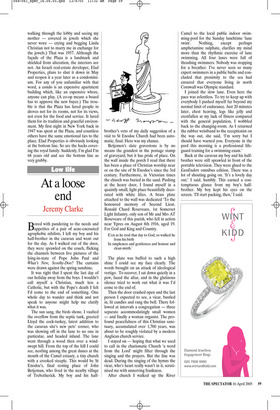At a loose end
Jeremy Clarke
Bored with pandering to the needs and appetites of a pair of acne-encrusted agrophobic nihilists, I left my boy and his half-brother in the caravan and went out for the day. As I walked out of the door, they were sprawled on the couch, flicking the channels between live pictures of the lying-in-state of Pope John Paul and What’s New, Scooby-Doo? The curtains were drawn against the spring sunshine.
It was right that I spent the last day of our holiday away from the boys. I wouldn’t call myself a Christian, much less a Catholic, but with the Pope’s death I felt I’d come to the end of something. One whole day to wander and think and not speak to anyone might help me clarify what it was.
The sun sang, the birds shone. I vaulted the overflow from the septic tank, greeted Lloyd the cock-turkey, latest addition to the caravan site’s new pets’ corner, who was showing off in the lane to no one in particular, and headed inland. The lane went through a wood then over a windswept hill. From the top of the hill I could see, nestling among the great dunes at the mouth of the Camel estuary, a tiny church with a crooked steeple. This would be St Enodoc’s, final resting place of John Betjeman, who lived in the nearby village of Trebetherick. My boy and his half brother’s veto of my daily suggestion of a visit to St Enodoc Church had been automatic, final. Here was my chance.
Betjemen’s slate gravestone is by no means the grandest in the postage stamp of graveyard, but it has pride of place. On the wall inside the porch I read that there has been a place of Christian worship near or on the site of St Enodoc’s since the 3rd century. Furthermore, in Victorian times the church was buried in the sand. Pushing at the heavy door, I found myself in a quaintly small, light place beautifully decorated with white lilies. A brass plate attached to the wall was dedicated ‘To the honoured memory of Second Lieut. Ronald Chard Roseveare, 1st Somerset Light Infantry, only son of Mr and Mrs AT Roseveare of this parish, who fell in action near Ypres on August 8th 1916, aged 19. For God and King and Country.
E’en as he trod that day to God, so walked he from his birth In simpleness and gentleness and honour and clean mirth.’
The plate was buffed to such a high shine I could see my face clearly. The words brought on an attack of ideological vertigo. To recover, I sat down quietly in a pew, faced the altar, and in the glutinous silence tried to work out what it was I’d come to the end of.
Then the door crashed open and the last person I expected to see, a vicar, bustled in, lit candles and rang the bell. There followed at intervals a congregation — three separate accommodatingly small women — and finally a woman organist. The profound peacefulness of this Christian sanctuary, accumulated over 1,700 years, was about to be roughly violated by a modern Anglican church service.
I stayed on — hoping that what we used to call in the charismatic Church ‘a word from the Lord’ might filter through the singing and the prayers. But the line was dead. During the singing of the hymns the vicar, who’s heart really wasn’t in it, scrutinised me with unnerving frankness.
After church I walked up the River Camel to the local public indoor swimming-pool for the Sunday lunchtime ‘lane swim’. Nothing, except perhaps amphetamine sulphate, clarifies my mind more than the rhythmic exercise of lane swimming. All four lanes were full of thrashing swimmers. Nobody was stopping for a breather. I’ve never seen so many expert swimmers in a public baths and concluded that proximity to the sea had ensured that everyone living in north Cornwall was Olympic standard.
I joined the slow lane. Even here the pace was relentless. To try to keep up with everybody I pushed myself far beyond my normal limit of endurance. Just 20 minutes later, chest heaving, legs like jelly and crestfallen at my lack of fitness compared with the general population, I wobbled back to the changing-room. As I returned the rubber wristband to the receptionist on the way out, she said, ‘I’m sorry but I should have warned you. Everyone in the pool this morning is a professional lifeguard training for a swimming exam.’ Back at the caravan my boy and his halfbrother were still sprawled in front of the portable television. They were glued to the EastEnders omnibus edition. There was a lot of shouting going on. ‘It’s a lovely day out,’ I said, humbly. This earned a contemptuous glance from my boy’s halfbrother. My boy kept his eyes on the screen. ‘I'll start packing, then,’ I said.
























































 Previous page
Previous page